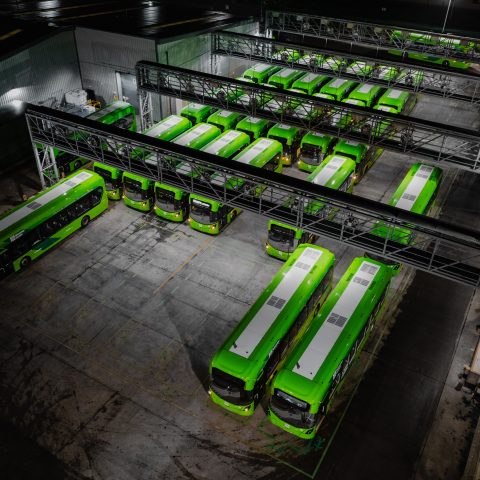Heliox is converting 5 further First Bus depots to electric charging operation (for over 190 e-buses)
Heliox and First Bus are collaborating on five new electric bus charging depots in Bristol, Weston-super-Mare, Minehead, Taunton, and Basildon. They’ll have a combined capacity to charge over 190 vehicles simultaneously First Bus is investing £89 million to expand electric fleet across the UK (with 178 new electric buses deployed across four regions) and aims […]

Heliox and First Bus are collaborating on five new electric bus charging depots in Bristol, Weston-super-Mare, Minehead, Taunton, and Basildon. They’ll have a combined capacity to charge over 190 vehicles simultaneously
First Bus is investing £89 million to expand electric fleet across the UK (with 178 new electric buses deployed across four regions) and aims to expand its charging network to 14 depots with more than 800 electric buses by 2025.
New chapter in First Bus – Heliox partnership
These depots, as mentioned above, will be strategically located in Bristol, Weston-super-Mare, Minehead, Taunton, and Basildon, and have been made possible thanks to an £89 million investment from First Bus and supported by the UK Government’s ZEBRA 2 funding programme.
The announcement builds on the partnership between Heliox and First Bus, unveiling the UK’s largest electric bus depot (capable of charging 178 vehicles simultaneously) ahead of the COP26 summit in Glasgow, Scotland in 2021.
Since then, the two companies have continued to work together to deliver a network of nine operational electric bus charging depots across Scotland (Glasgow Caledonia, Glasgow Scotstoun and Aberdeen) and England (York, Leeds Bramley, Leicester, Norwich, Portsmouth Hoeford, and Summercourt Cornwall). In Summercourt (Cornwall), the charging hub is the first-of-its-kind for the bus industry, providing direct access for the public to rapid charging infrastructure for electric cars and vans.
Innovative solutions for electric bus charging
What is interesting, “Heliox and First Bus have collaborated closely to design their depots as innovative, dual-purpose facilities that optimise space efficiency. These depots not only serve First Bus’s electric fleet, but also offer electric charging to local businesses – making EV charging more accessible to the wider community”, quoting the press release about the new project.
The partnership “has also implemented cutting-edge cable management solutions with remote-controlled overhead gantries – ensuring safe, efficient, and reliable charging operations at their depots. The use of overhead gantries minimises any loss of parking and allows cables to be lowered automatically to the vehicles. By sharing infrastructure and adopting advanced technologies, First Bus is leading the way in creating sustainable transportation solutions”.
“We are thrilled to continue our partnership with First Bus on their journey towards a zero-emission fleet,” said Stephen Wood, Heliox Country Manager UK & Ireland. “The huge £89m investment from First Bus and support from the ZEBRA 2 funding programme has enabled us to play a vital role in accelerating the transition to electric public transport, particularly in rural areas. These new charging depots will be instrumental in achieving this goal.”
Faizan Ahmad, Decarbonisation Programme Director, First Bus said: “These projects mark another significant milestone in our commitment to a zero-emission bus fleet across the UK. Our partnership with Heliox has enabled us to electrify our depots and introduce cutting-edge electric buses, delivering cleaner air and a better passenger experience. As a leader in sustainable transport, we’re committed to working with both central and local governments to support national decarbonisation goals and encourage more people to choose bus travel.”







